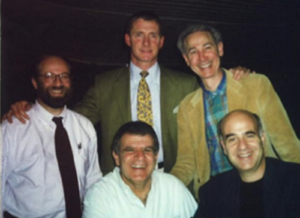
Hitler’s Seed Money & The Legal Struggle To Get It Back.

Clockwise from left: Paul Kerson, Sebastian Schuetz, Marc Leavitt, Ronnie Mandowski (seated), and Joseph Yamaner (seated).
We have presented Legal Education seminars about our landmark NAZI ERA Restitution Case involving the 1934 aryanization of the brewery-brauhaus conglomerate of Ignatz Nacher, who is credited with inventing pasteurization of beer. This 14 year saga, beginning with our Queens lawsuit that inspired the global Slave Labor settlement with Germany and multi-national corporations, ultimately reached the steps of the Supreme Court. The Nacher family heirs received significant compensation via post-reunification real estate claims in Germany. Click here for the notice of our 1/29/14 Queens Bar Seminar. Joseph and Paul became award winning faculty members of Lawline.com.
Nacher WWII Case
The Nazi era cases entitled Nacher v. Dresdner Bank, 198 F.R.D. 429 (D.N.J. 2000), 213 F. Supp. 439 (D.N.J. 2002), 236 F.R.D. 231 (D.N.J. 2006), 240 Fed. Appx. 980 (3d Cir. 2007), cert. den. 552 U.S. 1098 (2008) were the first to attempt to hold German corporations responsible for their nefarious acts during the Hitler era. Our client family were the descendants of Ignatz Nacher (credited with inventing Pasteurization of beer), whose Engelhardt Breweries conglomerate of breweries and beerhauses was aryanized in 1934. We inspired 52 other cases around the United States. Ultimately, the U.S. Treasury Department took over all 53 cases and convinced the German banks and industrial companies to create a 10 billion Deutschmark (US$5 billion) Fund for Remembrance, Responsibility and the Future that compensated every Holocaust surviving victim (and many descendants) of slave labor the world.
The Britt & Webb Cases
In Webb v. Goord, 340 F. 3d 105 (2d Cir. 2003) and Britt v. Garcia, 457 F. 3d 264 (2d Cir. 2006), we helped our client hold the New York State Department of Correctional Services to constitutional standards, and we won a $7.65 million jury verdict for a nearly-killed prisoner. The U.S. Court of Appeals sustained liability and sent the case back to the U.S. District Court of a new trial on the issue of damages. The case was settled on the eve of the second trial.
The Aaron Weiss Civil Rights And Ballot Access Case
Before we brought the landmark case of Weiss v. Feigenbaum, 558 F. Supp. 265 (E.D.N.Y. 1982), most New York City elections were cancelled because party bosses would conspire with local and state government employees and judges to remove insurgent candidates from the ballot. We won a U.S. District Court ruling forbidding the practice as unconstitutional. Since that time, the number of contested elections in New York City has increased dramatically.

